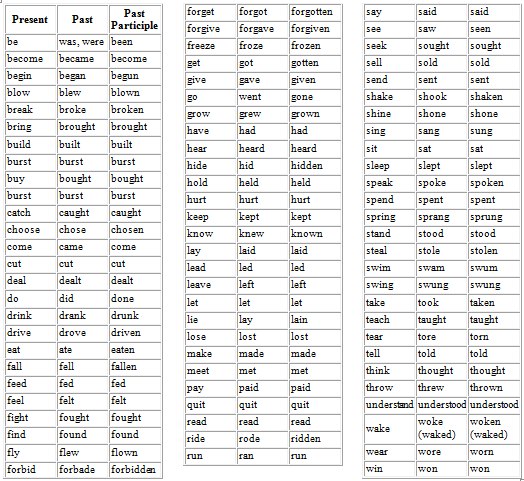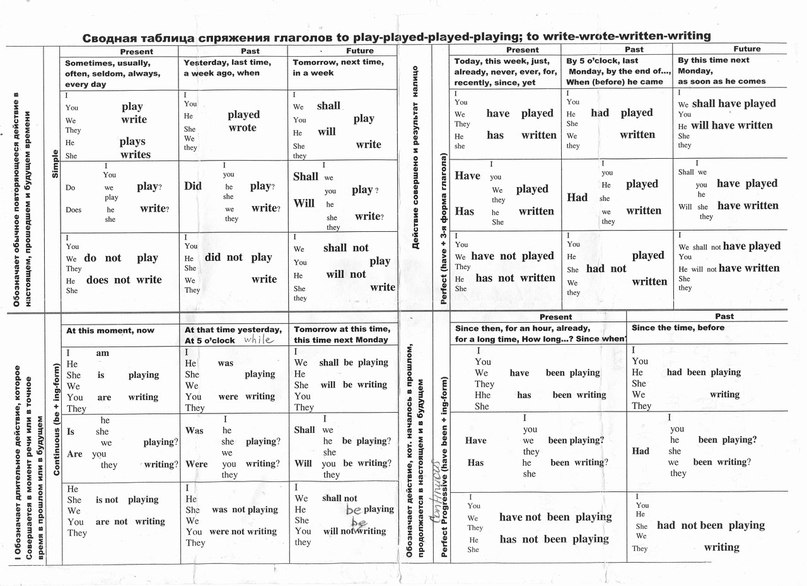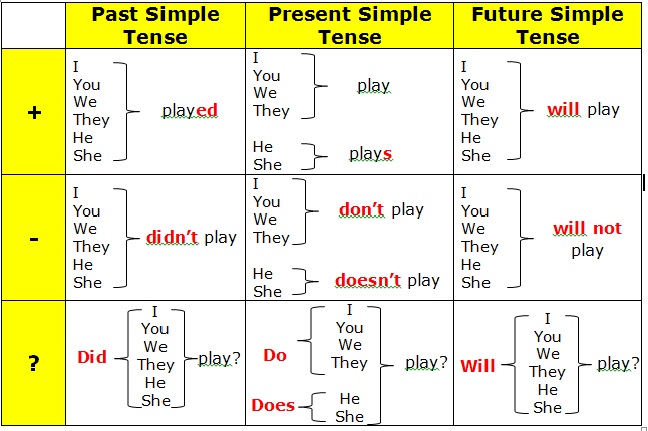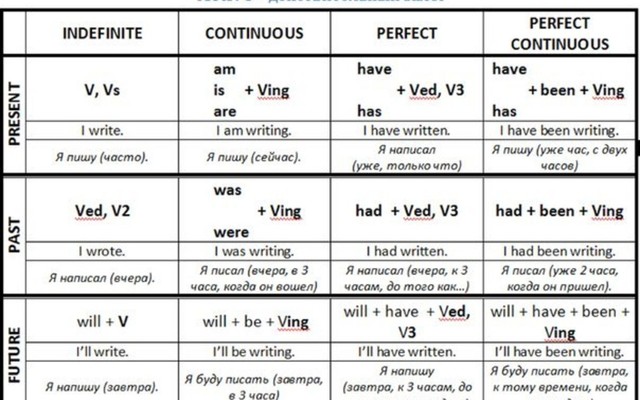| Мої файли [74] |
| Главная » Файлы » Мої файли |
| 13.10.2015, 09:47 | |
5 типов вопросов – это 5 разных схем, которыми пользуются англичане для того, чтобы задать вопрос. . Общий вопрос Общий вопрос – это вопрос, который предполагает в качестве ответа либо ДА, либо НЕТ. Т.е. вопрос для получения общей информации. В данном типе вопросов не используются вопросительные слова, и начинается он со вспомогательного глагола. Для каждого времени существуют свои вспомогательные глаголы. Давайте вспомним основное. Present Simple – DO/DOES Present Continuous – AM/IS/ARE Future Simple – WILL (SHALL) Past Simple – DID Present Perfect – HAVE/HAS Порядок слов в вопросе следующий: 1. Вспом. глагол – 2. Подлежащее (кто/что) – 3. Смысловой глагол (в нужной форме) – 4. Дополнение и определение
Примеры: – Do you play tennis every week? – Yes, I do/No, I don’t. – Is he a good driver? – Yes, he is/No, he isn’t. – Will we go to the restaurant tonight? – Yes, we will/No, we won’t. – Did she go to the disco yesterday? – Yes, she did/No, she didn’t. – Have you ever visited Poland? – Yes, I have/No, I haven’t. 2. Разделительный вопрос Разделительный, потому что этот вопрос состоит из 2-х частей, разделенный запятой. I часть – утверждение II часть – вопрос по данному утверждению, так называемый “корешок”. Как это выглядит? – You play tennis every day, don’t you? – He isn’t a good driver, is he? Как видно из примеров, “корешок” – это своего рода противопоставление утверждению. Т.е. цель разделительного вопроса – проверить подлинность утверждения. Эти вопросы очень часто используются в разговорной речи, когда собеседник “невзначай” пытается выяснить какую-то информацию на основе имеющихся фактов. Порядок слов: В I части все как в утверждении: подлежащее-глагол в нужной форме-дополнение Во II части используется вспомогательный глагол указанного в первой части времени. Если строим вопрос от утверждения, то в корешке будет отрицание. Если строим вопрос от отрицания, то в корешке будет утверждение. (см. примеры выше) В “корешке” используются местоимения, заменяющие подлежащее. Например: – Mary is a famous artist, isn’t she? (не …isn’t Mary?, не …is she?) Сложность данного вопроса в том, что не во всех временах вспомогательные глаголы используются для утвердительной формы. Так что нужно хорошо разбираться во временах, чтобы не делать ошибок. Например: – We work hard every day. – We work hard every day, don’t we? 3. Специальный вопрос Это вопрос для получения дополнительной информации. Поэтому он всегда начинается с вопросительного слова. Так как большинство вопросительных слов в английском языке начинаются с W, мы используем такой символ”W|?” в нашей опорной схеме (вверху статьи). Перечислим самые популярные вопросительные слова английского языка when – когда where – где, откуда why – почему how – как which – какой, который и т.п. Обратите внимание, что сюда не относятся слова WHO и WHAT, если они заменяют собой подлежащее. Порядок слов: 1. Вопросит. слово – 2. Вспом. глагол – 3 Подлежащее – 4. Смысловой глагол – 5. Дополнение Примеры: – When did you go to Moscow last time? – What is your name? – How do you get to work? 4. Вопрос с OR (или) Альтернативный вопрос Как можно догадаться из названия, этот вопрос предлагает выбор между двумя альтернативами. Например: – Do you like coffe or tea? – Has he got Mercedes or BMW? Порядок слов такой же, как и в общем вопросе, но в какой-то части обязательно нужно предложить альтернативу. Например: – Does your mother or your father help you with your homework? (альтернатива – подлежащее) – Has he just arrived or left? (альтернатива – смысловой глагол) – Will you go to Kiev by train or by plane? (альтернатива – дополнение) 5. Вопрос со словом Who (What) Если мы хотим задать вопрос к подлежащему (кто? что?), то используем данный тип вопроса. Как вы уже догадались, вопрос будет начинаться со слова WHO или WHAT. Особенностью данного типа вопросов является порядок слов. Мы используем тот же порядок слов, что и в утверждении. При этом who(what) условно стоит в 3-м лице единственного числа. Т.е. мысленно заменяем на he. Порядок слов 1. Who/What – 2. Смысловой глагол – 3. Дополнение Примеры – Who is this man? (не am, не are) – What was that? (не were)
А еще, не забывайте правило – какое время используется в вопросе, такое и в ответе. Т.е. если вопрос в Present Simple, то ответ тоже в этом времени. – Do you play tennis? – Yes, I play tennis every week.
Примеры заданий на парах: Past Ind He lived in Manchester - Он жил в Манчестере I worked in a hospital - Я работал в больнице Yesterday they played rock music - Вчера они играли рок Philip made many mistakes - Филипп сделал много ошибок Не говорить: Did you worked? или Did Philip made? Chris changed the light bulb in the kitchen Exercise 1 1. They cooked a French dish - ... ? Exercise 2 1. Did you see Mike on Monday? - ... ; Exercise 3 1. I saw Betty in a supermarket yesterday - ... ? Exercise 4 1. Ты ходил на концерт в пятницу? Exercise 5 1. Daniel started learning Spanish - ... ; Exercise 6 1. Did you take the money? - ... ; Future Ind Example: 1. They change the money; . Задать общие вопросы
Задать специальные вопросы
Задайте альтернативные вопросы к предложениям, используя предлагаемые в скобках варианты.
. Выберите из правой колонки верное окончание разделительного вопроса. Переведите вопросы. Н-р: 1 – е (Она необщительна, не так ли?)
7. Восстановите диалог между двумя любопытными соседями. — Where … Bob? — … is in the kitchen. — What is … doing? — He … … dinner. — … is Henry? — He … in … bedroom. — … is he …? — … is sleeping. — Where … Lucy? — She is in the living room. — And what … she doing? — She … watching…. — Where … Dick and Kate? — They are … home. They …studying…. — Where … the cat? — … is in the street. It … playing.
8. Insert the verbs in the Past Perfect tense. (Вставьте глаголы в Past Perfect.) I ... (to have) breakfast before I went to school. He went to meet his friends after he ... (to do) his homework. By 8 o’clock the rain ... (to stop). Alice was late because she ... (to miss) the bus. She went to the post-office after she ... (to write) the letter. He ... (to work) at the factory before he entered the college. He got a bad mark for his test because he ... (to make) a lot of mistakes in it. I went to bed after I ... (to finish) reading the book. The child ... (to fall) asleep before the parents came home. They ... (to marry) before they bought this house. 9. Say what action was done before. Combine the two sentences into one. (Oпределите, какое действие произошло раньше. Объедините два предложения в одно, не меняя части местами. Используйте BEFORE Example/ Пример I sent a telegram. Then I met my friend. — I had sent a telegram before I met my friend. The rain stopped. I went for a walk. I did my homework. My mother returned home. We met in the street. We went to the park. They packed their things. Then they started. I had dinner. I switched on the TV set. He returned home. The guests left. We came to the cinema. The film began. I read the book. I saw the play. They lived here. They moved to another place.
did, are, do, have, was, haven't, is, isn't What types of books ______ you like to read? _____ she reading love story or an a adventure story? ______ you seen «Titanic»? Who _____ watching TV at eight o'clock last night? It's an exciting book, ________ it? _____ you going to watch a romantic film or a musical? You have seen this film, _______ you. _____ you go to the cinema last night?
birthday / is / when / your? many / How / cards / did / get / you? mum / What / make / did / cake / your? at the party / you / did / what / do? like / you / parties / do / Why? summer / are / this / where / you / going? take / going / to / what / you / are? with / are / you / Who / going? do / going / to / you / there / What / are? you / stay / going / to / are / Where?
| |
| Просмотров: 1391 | Загрузок: 1 | Комментарии: 3 | | |
| Всего комментариев: 0 | |



 5
5